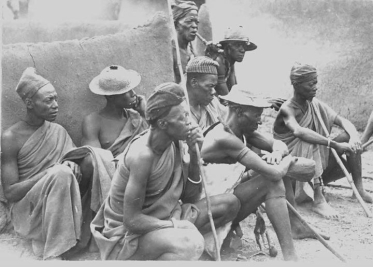Merriam Webster Dictionary (1828) defines ‘cognomen’ as a “distinguishing nickname or epithet.” In several cultures of the world, boys that have just attained puberty are likely to seek attention, particularly from their female counterparts. Their innate AGM (Attention-Getting Mechanism) triggers the adolescence crushes that they exhibit, including taking ego-massaging nick-names. An excited teenage boy is wont to declare: “Òmi àkpòlì” (I, the tempest). Another may take the appellation of “Ọ̀kákwū” (Hippopotamus) or “Ọ̀nyẹ̀” (Crocodile).
All these imaginary, heroic claims portray the image of a new ‘man’ brought up to fear weakness and embrace bravery and heroism. Sometimes, adolescence crushes flourish under the guise of showing off one’s macho image to the opposite sex – both co-travellers in the “no man’s land” of psychology. According to Carl Pickhardt, a psychologist, “Teenage crushes are an early approximation of romantic love.”
Taking a cognomen in Igala culture is not limited to infatuated young men. It extends to adults as well, mostly as a continuation of their teenage nick-names. In the royalty, this concept takes a larger-than-life significance. For instance, the Ata-Igala, the ultimate paramount ruler-elect, upon completing his coronation rites, is mandated, as a final action, to select a set of power-names. The general alias taken by every successor is ‘Ẹ̀jẹ̀ gbogìlì-gbogìlì,’ (the awe-inspiring Leopard). He is also respectfully addressed as ‘Ágábá-ìdù!’ meaning a combination of the ‘lioness’ (agaba) and the ‘lion’ (ìdù). The women, on their knees, salute him as ‘Ámidééjú!’ which, when translated in full, means: “If the Ata says I should live, I will live; but if he says I should die, I will die,” underscoring the pre-colonial, absolutist powers of the supreme ruler.
In terms of content, the aliases are usually couched in compact metaphors and hyperboles; sometimes it takes the form of proverbs and adages, to suit their kingship style. The populace is, then, left to decode them, requiring hard-headed interpretations that provide an insight into his personality, perceptions and set goals. Some of these names may also hint at his claim to invulnerability, sending a raw signal to his traducers who might still think of him as an ordinary mortal, having taken on a godlike persona.
Àtá Ògwùchẹ́-Akpá (1911 – 1919), the grandfather of the recently-installed incumbent, went by a well-known alias of: ‘Ákpá k’ì mú-ólù-dé.’ (The sky: that eclipses the sun). This cognomen mirrors the king’s resolve never to cower to the diminishing pressures of colonial officers – which had cost one of them (Ata Ocheje Aame Ocheje, who was installed in 1901) both his throne and dear life two years later, in 1903.
Ata Àámẹ́ Òbòní, in his tenure (1946 – 1956) took the epithet: “Ùgbákolo ọ̀tọ̀tọ̀lọ̀: ólí k’ì má bu ní, k’ì áro ùlàkà. (Ficus carica, a tree that does not flower before bearing fruits with spiteful aggression. This name captures the tortuous nature of his accession, which he miraculously survived and led to his installation in 1946.
His other cognomens, include ‘Àkpòlì’ (The Tempest), ‘Àkwúbàlíbà’ (A swarm of locusts) and “Òkwùnú-lebe-lebe, òkwùnú lébè-lèbè,” (Alligator-pepper (‘Áta’ in Igala language), a plant with tiny, peppery, magical seeds, which serve as a metaphor for his well-known, prophetic powers.
His eldest son and the 27th Ata-Igala, Michael Ìdákwó Àámẹ́ Òbòní Aame Oboni II, who sadly joined his ancestors in 2021, took the alias of ‘Àpọ́chí-ne-jọ́chí: Èékpá olí mà ánẹ́ ámolí.’ (A tree is known by its bark), suggesting a self-description of a mirror image of his father.
A new Ata-Igala, Matthew Àlájì Ọ̀pàlúwa Ògwùchẹ́-Akpá, his immediate successor, took his own set of mandatory power-names, numbering nine – a mystical Igala number. His cognomens and their literal and practical interpretations are discussed below:
- Àtá ajú Ògwùchẹ́-akpá, ák’íkò kì ákojí Bàbá: Àtákpá ègbò k’ì che ojínójí agbítì.
Literally, it means the grandson of King Ògwùchẹ́-Akpá: the sitting-room of the weak that turns to the graveyard of the strong.
Philosophically, it means: “the strong takes the weak for granted at his own peril.”
- Àtá omi k’ì gbà-gwú áwo-olí, k’ẹla abìgbà má neke mọ.
Ata, the tantalizing pool of rain-water that gathers in a hole on a tree-trunk that serves as an illusory drink to a thirsty, horned beast.
Ata, a personality catapulted by destiny to an enviably high office, a station that cannot be attained through deep pockets or by raw force.
- Àtá àdúdẹ, k’ì ák’ebíjè dá.
Ata, the pair of tongs that is so strong that it cuts any piece of iron into two. Ata, the numero uno: the insuppressible best among equals. \
4. Àtá òbútù mẹ̀mẹ̀, k’ì ájẹ agbà igẹ́. Ata, the pair of softly-fanned bellows: the one that surprisingly consumes enormous amounts of charcoal.
Ata, whose not-so-sturdy frame belies his enormous capacities and capabilities as a divine god-head.
5. Àtá anẹ́-ádú yẹ̀yẹ̀, k’ì má kp’adù fọ́.
Ata, the unhurrying load-carrier: who does not make a mistake and allow his load to fall down and break.
Ata, the tactful, strategic task-master: who takes a careful, holistic view of decisions before he acts on them.
6. Atá àlápa tìkà-tìkà: ùnẹ̀dọ̀ k’ì ádu ẹñwu-éjẹ kwó éjú-uná. Ata, the pair of pliers: that fearless one that ventures into an open fire to take some food.
Ata, one who is never deterred by obstacles, no matter how inhibiting, once he sets out to achieve the object of a set goal.
7. Àtá ùlòkò k’ì nó éjú-ugbá, k’ì má nẹ ùmájáà.
Ata, the red feather of the Crested malimbe displayed among other wares, which takes the shine off them all.
Ata, the proverbial gold-fish: whose conspicuous, distinctive identity and profile cannot be hidden from the entire world.
8. Àtá òlùbọ ẹnẹ k’ì má jẹ̄ àkẹ̀chẹ̀. Ata, the shadow of a man: that is never susceptible to push and pull of physical force.
Ata, the target that is visible to the enemy: but which remains constantly elusive to him.
9. Àtá ogwu kù mà néjú ọgbá, k’ì ájẹ ẹnẹ lè ùbì. Ata, the war expected to come from the front: that comes stealthily from behind. Ata, the unpredictable master-strategist: that surprises his unsuspecting enemy from unlikely locations.









